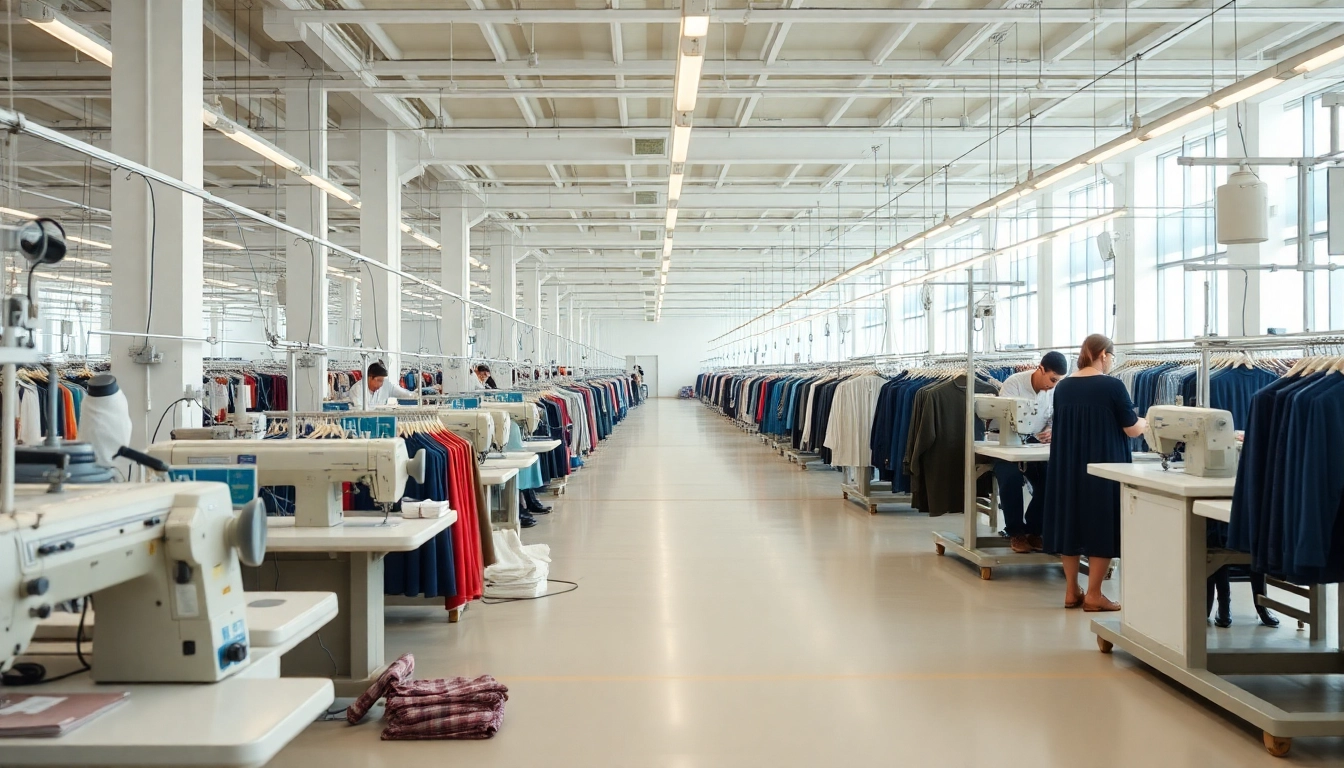Understanding the Role of Clothing Manufacturers in Your Brand Success
In today’s highly competitive apparel industry, finding the right Clothing Manufacturers is a pivotal step toward establishing a successful fashion brand. These manufacturing partners are the backbone of your supply chain, impacting everything from product quality and innovation to delivery timelines and cost efficiency. Whether you’re an emerging startup or an established label, understanding the intricacies of clothing manufacturing can significantly influence your brand’s growth trajectory. This comprehensive guide will explore the fundamental aspects of clothing manufacturers, key factors for selecting optimal partners, emerging trends, and practical steps to collaborate effectively.
Defining Clothing Manufacturing and Its Importance
Clothing manufacturing refers to the process of transforming raw textiles and materials into finished garments that meet specific design, quality, and functional standards. This involves a series of steps including pattern making, fabric cutting, sewing, finishing, and quality control. The manufacturing process is crucial because it directly affects product quality, cost, and ability to scale operations. Reliable manufacturers offer consistency, adherence to deadlines, and compliance with international standards—all vital for building consumer trust and brand reputation.
Choosing the right manufacturing partner allows brands to concentrate on design, marketing, and customer engagement while leaving the complex production processes to seasoned industry players. As the fashion world evolves with fast-changing trends and consumer expectations, manufacturers are also adopting new technologies and sustainable practices to meet these demands effectively.
Key Factors for Choosing the Right Manufacturer
1. Certifications, Experience, and Capacity
One of the first considerations when selecting a clothing manufacturer is verifying their certifications—such as ISO, SA8000, or other industry-specific standards—ensuring compliance with safety, environmental, and labor laws. Experience matters; established manufacturers with a proven track record are more likely to deliver consistent quality and handle complex designs.
Assess the manufacturer’s capacity to produce your order volume, whether small-batch or mass production. An ideal partner should accommodate your current needs and scale up efficiently as your brand grows.
2. Quality Control Processes
Robust quality control procedures minimize defects and ensure products meet specifications. Inquire about their inspection protocols, sample approval processes, and how they handle issues that arise during production. Visiting the factory or requesting detailed quality assurance reports can further validate their standards.
3. Flexibility and Lead Times
Responsive manufacturers that can adapt to design changes and deliver within your required timelines are invaluable. Discuss lead times upfront and confirm their ability to meet deadlines without compromising quality.
4. Pricing and Minimum Order Quantities (MOQs)
While affordability is key, the cheapest option might not always deliver the best quality. Strive for a balance that aligns with your budget and quality expectations. Low MOQs are especially advantageous for startups testing new markets or designs, enabling flexibility and reducing financial risk.
5. Communication and Cultural Compatibility
Effective communication ensures smooth collaboration. Choose partners who understand your brand vision, communicate transparently, and are receptive to feedback. Cultural compatibility, especially with overseas manufacturers, influences project management and problem resolution.
How Manufacturers Impact Product Quality and Timelines
The manufacturing process has a direct bearing on the final product quality and delivery schedules. High-quality manufacturers invest in skilled labor, modern machinery, and quality control systems that produce consistently superior garments. Conversely, poor manufacturing practices often lead to defects, material wastage, delays, and increased costs.
Timely delivery hinges on efficient production planning and reliable logistics. Overloaded factories or those unfamiliar with your product complexity might struggle with deadlines, resulting in stockouts or missed market opportunities. Therefore, it’s crucial to select partners with proven delivery performance and transparent communication channels.
Top Locations and Markets for Clothing Manufacturers
Why Pakistan Is a Leading Hub for Apparel Production
Pakistan stands out as a global leader in clothing manufacturing, especially for knitwear, woven garments, and technical textiles. Its competitive advantage lies in an established textile industry, cost-effective labor, and a skilled workforce. Countries like Pakistan also benefit from government incentives, free trade agreements, and Strategic geographic location, making it an ideal outsourcing destination for brands seeking quality at affordable prices.
Major Cities with Reputable Clothing Manufacturers (Karachi, Lahore, Sialkot)
Karachi: Known as Pakistan’s commercial hub, Karachi hosts numerous factories specializing in fashion apparel, exports, and private label manufacturing.
Lahore: Recognized for its extensive textile industry, Lahore offers diverse manufacturing facilities, from casual wear to luxury fashion items.
Sialkot: Famous for sportswear, performance gear, and technical textiles, Sialkot has a robust manufacturing ecosystem with a reputation for swift turnaround times.
Emerging Markets and Future Trends
Beyond Pakistan, countries like Bangladesh, Vietnam, and Ethiopia are gaining prominence due to their growing textile infrastructure and competitive wages. Future trends include increased automation, adoption of Industry 4.0 technologies, and an emphasis on sustainability—factors that are reshaping the global clothing manufacturing landscape.
How to Evaluate and Partner with Clothing Manufacturers
Assessing Capabilities: Certifications, Experience, and Capacity
Begin by investigating potential partners’ credentials, client portfolio, and manufacturing capacity. Visiting the factory in person or virtually can provide insights into operational standards. Certifications like ISO 9001 or environmentally friendly accreditations add credibility.
Requesting Samples and Managing Quality Control
Always request samples before full-scale production. Use samples to evaluate fabric quality, stitching, fit, and finishing. Establish clear quality control protocols and consider third-party inspections for peace of mind.
Building Long-Term, Mutually Beneficial Relationships
Mutual trust, transparency, and frequent communication underpin successful manufacturing partnerships. Developing long-term relationships can lead to better pricing, priority production slots, and tailored services aligned with your brand’s evolution.
Latest Innovations and Sustainability in Clothing Manufacturing
Technological Advancements Improving Efficiency
Smart factories utilizing automation, AI-driven quality checks, and real-time data analytics enhance productivity and reduce waste. Digital sampling, 3D simulations, and virtual prototyping accelerate design iterations, saving time and costs.
Sustainable Practices and Eco-Friendly Materials
Environmental consciousness is transforming manufacturing. Brands now prioritize eco-friendly fabrics like organic cotton, recycled polyester, and Tencel. Manufacturers adopting waterless dyeing, waste recycling, and renewable energy sources demonstrate industry leadership and appeal to eco-aware consumers.
Case Studies of Successful Manufacturing Partnerships
Leading brands have partnered with manufacturers who prioritize sustainability and innovation. For example, collaboration with a factory that uses biodegradable packaging and renewable energy has not only minimized environmental impact but also bolstered brand image and customer loyalty.
Steps to Start Working with Clothing Manufacturers Today
Creating Clear Designs and Technical Specifications
Develop detailed sketches, tech packs, and fabric specifications. Clear documentation minimizes misunderstandings and ensures manufacturers produce exactly what you envision.
Negotiating Lead Times and Pricing
Engage in transparent negotiations regarding order costs, MOQ, delivery schedules, and payment terms. Building flexibility into agreements can accommodate unforeseen challenges.
Launching Your First Production Run with Confidence
Conduct a pre-production sample approval, verify all specifications, and establish communication channels for real-time updates throughout manufacturing. A well-planned launch minimizes risks and maximizes quality assurance.



